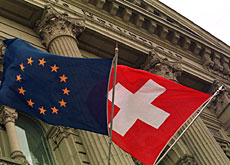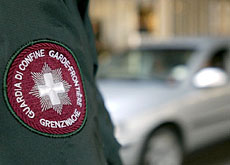Unions sound alarm as labour barriers come down

From June 1, European Union nationals have had unfettered access to the Swiss labour market, prompting fresh warnings of wage dumping from unions.
Two years ago, Swiss nationals were given leave to work in most EU countries as part of a bilateral agreement to dismantle restrictions on the movement of workers.
Bern is now obliged to lift labour restrictions on EU nationals as part of a reciprocal agreement allowing for the free movement of labour, which came into force in June 2002.
The second phase, which started on Tuesday, removes the priority given to Swiss workers in the domestic labour market. Bern won the delay during negotiations amid fears of an influx of cheap labour.
The accord applies to the “older” 15 member states. Nationals of the ten new EU members, which joined on May 1, will likely have to wait several more years before they gain access to the Swiss labour market.
“Citizens of the 15 EU member states can freely come to Switzerland within the quotas of 15,000 [long-term residence permits] per year. That’s the only limitation that remains, provided they find a [job],” Dieter Grossen, the deputy head of the Federal Immigration Office, told swissinfo.
Deadline
Some EU countries, notably Britain and Germany, extended the right to work to Swiss nationals in 2002 – two years before the deadline. Now the rest of the 15 states will have to follow suit.
Unions in Switzerland remain concerned about the easing of restrictions, saying they could lead to downward pressure on wages, particularly in border regions. They also warn that not all cantons or industries are ready to deal with a possible influx of workers.
Parliament has agreed measures to combat wage dumping and to prevent a weakening of protections for workers.
These include regulating working conditions for employees sent to Switzerland for a limited time by companies based abroad and the fixing of minimum wages and working hours.
The new measures are to be overseen by tripartite commissions – one for each canton – which are made up of government as well as employer and employee representatives.
Protection
But the unions say these measures do not provide proper protection for employees.
“Switzerland is badly prepared to open up its labour market because it can’t make use of a minimum wage, and there are not very many collective wage agreements,” said Serge Gaillard from the Swiss Federation of Trade Unions.
He added that the situation was particularly acute in the retail sector, and in agriculture and transport.
The government dismisses such concerns. “For a year now, the cantons have had the necessary legislation at their disposal to organise themselves,” said Grossen.
Warnings about wage dumping, and an influx of foreign workers, have featured prominently in political debate since the accord came into force in 2002. But so far, such fears have proved unfounded.
Enforcement
The unions say the measures may be adequate, but the problem has to do with enforcement.
“Some border cantons such as Geneva and Ticino are already well prepared…[but] all in all the cantons have been slow to react and we reckon that in many cantons the measures won’t work and the unions will have to get involved,” said Regula Rytz, secretary of the Federation of Trade Unions.
Rytz said many cantons did not have the money to put the measures in place and that there had been a lack of guidance from the federal government.
“They are good instruments to stop wage dumping for Swiss and foreign workers but if they are not properly controlled then it won’t work. The whole success of these commissions depends on how much money they receive… to help them watch over the labour market,” she told swissinfo.
The unions want at least 100 more inspectors to help ensure that these accompanying measures are actually put into force.
swissinfo, Isobel Leybold
The accord, which came into force in 2002, scraps restrictions on EU nationals wanting to work in Switzerland, and vice versa.
Fears of an influx of foreign workers and wage dumping in Switzerland have so far failed to materialise.
EU citizens will still be subject to a quota of 15,000 until 2007. No quotas apply to Swiss citizens wanting to work in the EU.
For the ten new EU members, the free movement of people agreement will not enter into force until 2005 and may still be put to vote.

In compliance with the JTI standards
More: SWI swissinfo.ch certified by the Journalism Trust Initiative












You can find an overview of ongoing debates with our journalists here . Please join us!
If you want to start a conversation about a topic raised in this article or want to report factual errors, email us at english@swissinfo.ch.